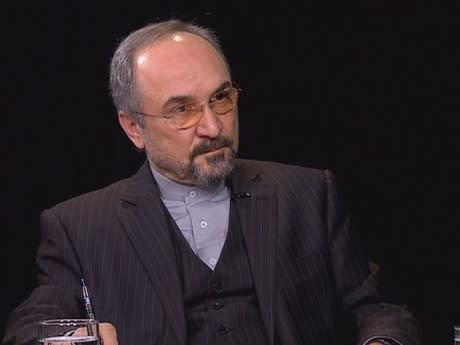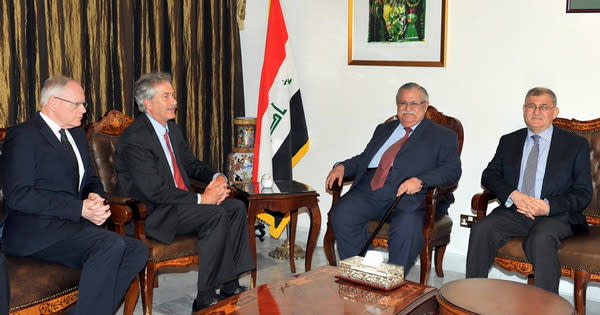 The Envoy
The EnvoyNew details on Obama’s demarche to Iran, as Ashton releases Iran talks proposal

Last week, the White House--in response to a New York Times report that President Obama had sent a warning to Iran's Supreme Leader against closing the Strait of Hormuz--acknowledged that it had a variety of ways to communicate with the Islamic Republic, despite the over 30 year breach in diplomatic relations between the two countries.
"We have a number of ways to communicate our views to the Iranian government, and we have used those mechanisms regularly on a range of issues over the years," White House spokesman Jay Carney said at at a Jan. 13th press conference.
But the details of the communications mechanism have remained something of a mystery, with the White House this week disputing Iranian media reports that Obama had sent a "letter" to Iran's Supreme Leader offering direct bilateral talks.
"Obama's message to the Iranian leader was a standard diplomatic communication--not a letter--relaying privately what the United States has said publicly about red-lines in the Strait of Hormuz, a source explained on condition of anonymity to discuss sensitive diplomatic communications," Yahoo News reported Wednesday. "The diplomatic demarche also repeated the message that the United States and its UN Security Council partners remain committed to a diplomatic solution to tensions."

Now, Yahoo News has learned some new details about the latest U.S. message to Iran and how it was delivered--and it appears that rather than the postman ringing twice--that in this case, the United States chose at least two postmen and women, and possibly three.
Involved in the transfer were the Swiss envoy to Tehran--the United States' official diplomatic proxy and protector in Iran; a second hand-off occurred between Obama's UN envoy Susan Rice and the Iranian mission to the United Nations in New York, U.S. sources indicated. In addition, according to an unconfirmed Iranian account, there may also have been a third relay: from Iraq's President Jalal Talabani to the office of Iran's Supreme Leader.
In perhaps one rare encouraging signal that Iran seemingly at least received the U.S. message relatively free of distortion, Iran's foreign ministry said this week Iranian officials had received the same message--three times.
Iran Foreign Ministry spokesman Ramin Mehmanparast "said that Iran has received a US message regarding the Strait of Hormuz via three different channels," Iran's IRIB news service reported Monday.
"The US Ambassador to the UN Susan Rice had handed a letter to Iran's Ambassador to the UN Mohammad Khazaee; the Swiss Ambassador to Tehran, Livia Leu Agosti, also conveyed the same thing; and Iraqi President Jalal Talabani delivered the same message to Iranian officials," Mehmanparast said, the IRIB report continued.
However, one U.S. source disputed Friday that Talabani was used in this case. How to reconcile the 180-degree conflicting accounts of that one small claim is but one gloomy demonstration of the almost Talmudic layers of complexity involved in the larger U.S.-Iran diplomatic impasse.
After all, why would the Iranians have said he was used, if he wasn't? Especially given they seemingly accurately reported the other two channels, the Swiss and the UN? One American theory has it that the Iranians claimed Talabani was used in order to try to establish him as a future conduit.
Another possibility is that Talabani was used as a back-channel but that the decision to do so was kept more close hold or compartmentalized in the U.S. diplomatic apparatus. One hint of possibility on that front is that Deputy Secretary of State Bill Burns paid an unannounced visit to Iraq Jan. 14th and met with Talabani, according to Iraqi media reports. That would be one day before the Iranians said they got the U.S. message for a third time from the Iraqi Kurdish leader.
Burns visit with Talabani "was not a 'secret trip' by any means," a State Department official told Yahoo News Saturday. "We never announce Iraq stops in advance."
A second US official said the agenda topics for Burns'-Talabani meeting were not focused on Iran, but he did not know if the topic came up.
"First, on the Strait of Hormuz, this is not just a concern of the U.S. or Turkey," Burns said a few days earlier in a Jan. 12 interview in Turkey with the Anadolu news service. "I think the international community's position is very clear: that free passage through the Strait of Hormuz is an internationally recognized right. Any threat to interfere in any way with that internationally recognized right of free passage is provocative and reckless."
The office of Obama's UN envoy Rice referred questions about her described role transferring the communication to the Iranian mission back to the State Department and White House.
"We've got multiple channels," one State Department official told Yahoo News Friday. "Not gonna confirm any of 'em, sorry."
Regarding Talabani, one diplomatic source noted that the Iraqi Kurdish leader has played a role as an intermediary between Washington and Tehran before.
The Iraqi president "is friends with the U.S. and has good relations with Iran," the diplomat told Yahoo News Friday on condition of anonymity. Talabani "has access to the Supreme Leader. He has direct access to the ruler."
It was only recently, when Obama thanked Talabani upon the release in September of two American hikers jailed by Iran for two years, that Talabani came on the public radar as one back-channel intermediary Washington used to try to secure the men's release.
"We are deeply grateful to His Majesty Sultan Qaboos bin Said of Oman, Iraqi President Jalal Talabani, the Swiss government, and to all our partners and allies around the world who have worked steadfastly over the past two years to secure the release of Shane and Josh," President Obama said in a September 21, 2022 statement thanking the parties that helped secure the release of Shane Bauer and Josh Fattal.
However, despite the signs of an evidently functioning messaging system, American officials said they are overall quite discouraged about prospects for resolving the stalemate with Iran over its nuclear program anytime soon--or even getting to the negotiating table. Expectations in the fall that new international talks on Iran's nuclear program might resume in January have dissipated, in American eyes. That is in large part due to the fact that Iran has yet to respond in writing to a proposal to resume talks issued by European Union High Representative Catherine Ashton back in October.
On Friday, Ashton's office released her October 21st letter to Iran's chief nuclear negotiator Saeed Jalili, outlining proposed terms for resumed international nuclear talks--in a further effort to prod Iran to issue a formal RSVP.
"We are waiting for the Iranian reaction," Ashton's note pointedly closed.
Iran Foreign Minister Ali Akbar Salehi said Thursday in Istanbul that Iran would like to return to talks, and Turkey's Foreign Minister Ahmet Davutoglu reissued his invitation to host the talks Thursday.
But to date, Iran has not responded to Ashton's offer, American and European officials said this week.
"We all are seeking clarity about the meaning behind Iran's public statements that they are willing to engage, but we have to see a seriousness and sincerity of purpose coming from them," Secretary of State Hillary Clinton said at a news conference with her German counterpart Guido Westerwelle at the State Department Friday.
Iran "can come back to the table, as we have consistently made clear to them, and address the nuclear program concerns that the international community rightly has or face increasing pressure and isolation," she said, adding: "I want to underscore we do not seek conflict."
Updated: This post was updated Friday with the additional U.S. account disputing Iranian claims Iraq's Jalal Talabani was used as a third intermediary, and with Secretary of State Hillary Clinton's comments urging the Iranians return to talks. It was later updated late Friday with the Iraqi media report noting Deputy Secretary of State Bill Burns' Jan. 14th meeting with Iraqi President Jalal Talabani, confirmed Saturday by the State Department.
Other popular Yahoo! News stories:
Want more of our best national security stories? Visit The Envoy or connect with us on Facebook and on Twitter.
Want more politics? Visit The Ticket or connect with us on Facebook, follow us on Twitter, or add us on Tumblr. Handy with a camera? Join our Election 2012 Flickr group to submit your photos of the campaign in action.
